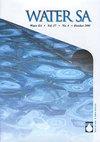对未经处理的家庭灰水质量的审查,以告知南非节水风险权衡
IF 1.2
4区 环境科学与生态学
Q4 WATER RESOURCES
引用次数: 0
摘要
南非对回用灰水的兴趣日益增加,因为面对日益增长的需求和干旱,有可能补充稀缺的淡水资源。本文旨在通过对来自南非先前研究的灰水质量结果的统计分析,告知与住宅使用未经处理的灰水相关的节水风险权衡。本综述中的灰水来源包括浴室,厨房,洗衣房,混合和一般住宅来源。注意到报告的每一种物理、化学和微生物成分按来源和结果集之间存在差异。某些来源的pH值、电导率和磷值之间存在显著的统计学差异。对每种成分进行的风险评估揭示了进一步的可变性。高风险样品数量最多的成分是总溶解固体。鉴于这种可变性,灰水做法在公共卫生、环境和基础设施方面的风险和负面后果相对较高,因此可以深入了解其与潜在节水之间的权衡关系。建议用户对与灰水再利用相关的潜在饮用水节约和改进的风险管理有更细致的认识。本文章由计算机程序翻译,如有差异,请以英文原文为准。
A review of untreated household greywater quality to inform the water saving–risk trade-off in South Africa
Interest in greywater reuse is increasing in South Africa, because of the potential to supplement scarce freshwater resources in the face of increasing demand and aridity. This paper aims to inform the water saving–risk trade-off associated with residential untreated greywater use, through a statistical analysis of greywater quality results as sourced from prior South African studies. Greywater sources included in this review were the bathroom, kitchen, laundry, mixed and general residential sources. Variability in terms of each of the reported physical, chemical and microbiological constituents by source and between result sets was noted. Statistically significant differences were evident between the pH, conductivity and phosphorus values of certain sources. A risk assessment undertaken for each of the constituents revealed further variability. The constituent with the highest number of high-risk samples was total dissolved solids. The relatively high risk and negative consequences in greywater practices in terms of public health, the environment, and infrastructure, given this variability, provide insight into the trade-off with potential water savings. It is recommended that a more nuanced view of the potential potable savings associated with greywater reuse and also improved risk management is required by the user.
求助全文
通过发布文献求助,成功后即可免费获取论文全文。
去求助
来源期刊

Water SA
环境科学-水资源
CiteScore
2.80
自引率
6.70%
发文量
46
审稿时长
18-36 weeks
期刊介绍:
WaterSA publishes refereed, original work in all branches of water science, technology and engineering. This includes water resources development; the hydrological cycle; surface hydrology; geohydrology and hydrometeorology; limnology; salinisation; treatment and management of municipal and industrial water and wastewater; treatment and disposal of sewage sludge; environmental pollution control; water quality and treatment; aquaculture in terms of its impact on the water resource; agricultural water science; etc.
Water SA is the WRC’s accredited scientific journal which contains original research articles and review articles on all aspects of water science, technology, engineering and policy. Water SA has been in publication since 1975 and includes articles from both local and international authors. The journal is issued quarterly (4 editions per year).
 求助内容:
求助内容: 应助结果提醒方式:
应助结果提醒方式:


